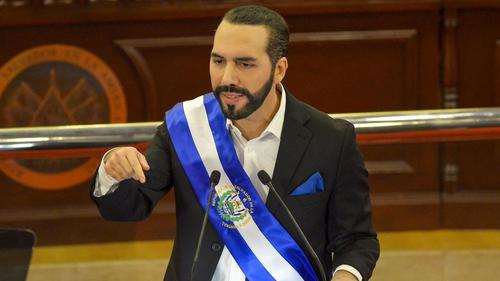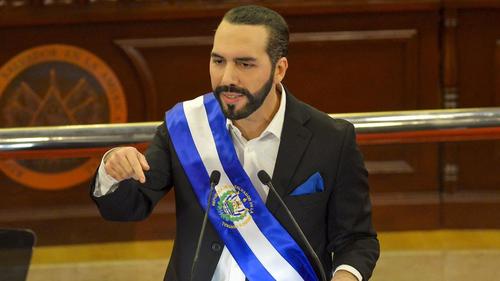(Zero Hedge) El Salvador, whose economy last year suffered its deepest crash in four decades, became the first country to adopt bitcoin as legal tender on Tuesday, a real-world experiment proponents say will lower commission costs for billions of dollars sent from abroad and which could spark widespread adoption among challenged, developing countries suffering from rampant inflation, but which critics warned may fuel money laundering.The revolutionary monetary change – first previewed here in June – means businesses should accept payment in bitcoin alongside the US dollar, which has been El Salvador’s official currency since 2001 and will remain legal tender.
Related Crypto: The Bitcoin Lightning Strike
by Tyler Durden, September 7th, 2021
President Nayib Bukele, who has pushed for adopting the cryptocurrency, says it will help Salvadorans save about $400 million the government calculates is spent annually on commissions for remittances, while giving access to financial services to the unbanked. The young president (only 40 years old) is popular with the public but has been accused of eroding democracy, including by the administration of Joe Biden (nearly twice his age).

Meanwhile, doubters say bitcoin could increase regulatory and financial risks for the Central American nation, and polls show Salvadorans are wary of the volatility of the cryptocurrency, although other polls show Salvadorans would be more than happy with the volatility if it meant continued gains.
To warm up a skeptical public, Bukele promised every citizen $30 in bitcoin if they sign up for a government digital wallet. Ahead of the launch, El Salvador bought 400 bitcoins, Bukele said, helping drive the currency price above $52,000 for the first time since May
El Salvador has just bought it’s first 200 coins.
Our brokers will be buying a lot more as the deadline approaches.#BitcoinDay #BTC🇸🇻
— Nayib Bukele (@nayibbukele) September 6, 2021
El Salvador just bought 200 new coins.
We now hold 400 #bitcoin#BitcoinDay 🇸🇻
— Nayib Bukele (@nayibbukele) September 6, 2021
And true to form, after surging earlier, bitcoin slumped 4% lower to $50,516 just hours later.
That said, as of early morning Tuesday, El Salvador’s wallet had not appeared on Apple, Google and Huawei’s app download platforms according to Reuters, prompting a series of tweets from Bukele, including one with an angry emoticon. “Release him! @Apple @Google and @Huawei,” Bukele said. The wallet was later available from Huawei.
Release him! 😡@Apple, @Google, @Huawei #BitcoinDay #BTC🇸🇻 https://t.co/pE3LPtj9Uo
— Nayib Bukele (@nayibbukele) September 7, 2021
To be sure, many citizens were were optimistic: “It’s going to be beneficial … we have family in the United States and they can send money at no cost, whereas banks charge,” said Reina Isabel Aguilar, a store owner in El Zonte Beach, some 49 km (30 m) southwest of capital San Salvador.
Known as Bitcoin Beach, the town of El Zonte aims to become one of the world’s first bitcoin economies. However, uptake may be slowed by low internet penetration across the country. It remains unclear whether businesses will be sanctioned if they do not adopt the new currency.
As we previously reported, in the run-up to the launch, the government installed ATMs that will allow bitcoin to be converted into dollars and withdrawn without commission from the digital wallet, called Chivo.
Bukele on Monday asked for patience: “Like all innovations, El Salvador’s bitcoin process has a learning curve,” he said on Twitter. “Not everything will be achieved in a day, or in a month.”
Mejor despacio y con buena letra.
Un poquito de paciencia.
— Nayib Bukele (@nayibbukele) September 7, 2021
The people will likely listen: so popular is Bukele that in barely two years in office, he has taken control of almost all levers of power. Last week, top judges appointed by his lawmakers ruled he could serve a second term. Bukele has promised to clean up graft, but the Biden administration recently put some of his close allies on a corruption blacklist.
Naturally, critics – including most establishment economist and central bankers who hope to promote their own digital currencies – warn that adopting the cryptocurrency could fuel money laundering. What they really mean is they are scared the country’s dependence on the dollar could fade.
Sure enough, there has been a full-court press and after the bitcoin law was approved, rating agency Moody’s downgraded El Salvador’s creditworthiness, while the country’s dollar-denominated bonds have also come under pressure. The move has muddied the outlook for El Salvador’s quest for more than $1 billion in financing from the International Monetary Fund (IMF).
But Bukele, who does not shy away from controversy, on Monday retweeted a video that showed his face superimposed on actor Jaime Foxx’s in a scene from Django Unchained, a Quentin Tarantino film about American slavery. The video portrayed Bukele whipping a slave trader who had the IMF emblem emblazoned on his face. Bukele later deleted the retweet.
In his own tweet, Bukele said: “We must break the paradigms of the past. El Salvador has the right to advance towards the first world.”
Following are some of the pros and cons that have surfaced over the El Salvador plan courtesy of Reuters:
- Remittances: Salvadorans last year sent home almost $6 billion from abroad, mostly from the United States. The sum is equivalent to some 23% of the country’s GDP. Bukele said last month bitcoin would allow Salvadorans to save on $400 million each year in commissions for remittances. But many of the very people sending or receiving dollars to El Salvador are mistrustful of bitcoin. Meanwhile, World Bank data shows that the dollarized Central American country’s U.S. remittance costs are already some of the lowest worldwide. Only 30% of Salvadorans had a bank account in 2017, according to the World Bank, raising hopes bitcoin could promote financial inclusion. However, a 2020 study concluded El Salvador had the second lowest internet penetration in Latin America and the Caribbean, which could limit uptake of the online currency.
- Carbon Footprint: El Salvador’s bitcoin plan has put a spotlight on the environmental impact of cryptocurrencies, with the World Bank flagging such potential adverse affects among its concerns. Extracting digital currency from cyberspace requires large amounts of energy, and the bitcoin industry’s global CO2 emissions have risen to 60 million tons, equal to the exhaust from about 9 million cars, Bank of America said in March. Bukele sought to counter sustainability concerns by saying in June he had instructed state-owned geothermal electric firm LaGeo to develop a plan to offer bitcoin mining facilities using renewable energy from the country’s volcanoes.
- Regulatory compliance: While advocates pitch bitcoin as innovation that is independent of governmental caprice, it has sparked warnings that it could increase regulatory, financial and operational hazards for financial institutions, among them international anti-money laundering and terrorist financing rules. In June, rating agency Fitch Ratings noted “capital gains will not be taxed and taxes can be paid in bitcoin, which could attract foreign inflows of bitcoin to the country. This may increase the risks that proceeds from illicit activities pass through the Salvadoran financial system.” The International Monetary Fund has cited legal concerns about bitcoin’s adoption amid its talks with El Salvador over a nearly $1 billion financing agreement, which remains pending. After Bukele’s bitcoin law was approved, rating agency Moody’s downgraded El Salvador. The country’s dollar-denominated bonds have also come under pressure.
- Foreign Exchange: Bukele has set up a $150 million fund to enable conversion into dollars, but doubts persist over how the country will avoid risks linked to sharp fluctuations in the digital currency, whose value can vary by hundreds of dollars in a day. Fitch argued that bitcoin would be credit negative for Salvadoran insurance companies exposed to the currency due to higher foreign exchange and earnings volatility risk. “Insurers that hold bitcoin on their balance sheets for extended periods will be acutely exposed to its price volatility, increasing asset risk,” Fitch said. Still, for those holding bitcoin, it has proven a popular means of payment in El Zonte, a beach town that was one of the springboards for the cryptocurrency in El Salvador. Provided there are no snags with convertibility, that has spurred hopes it could be an important foreign exchange earner.
So will El Salvador’s historic trip down bitcoin lane be imitated by others? While many believe it is inevitable that many countries will piggyback, especially socialist basket cases like Venezuela or countries whose economy has been gutted like Afghanistan, others – such as investor Mark Mobius – are skeptical. Mobius told Bloomberg TV that El Salvador’s move to adopt Bitcoin as legal tender is unlikely to set off a rush among other countries to follow suit.
The co-founder at Mobius Capital Partners, who spent more than three decades at Franklin Templeton Investments, told Bloomberg TV that few if any other nations are likely to embrace Bitcoin as legal tender, calling the largest digital coin inconvenient and risky.
“Maybe a few other countries with financial problems will adopt it,” said Mobius, naming Cuba as one example. “If governments — particularly the U.S. government — allow payment of taxes in Bitcoin or some other cryptocurrency, then I would change my mind, because then it would become an internationally recognized currency. But as it stands I don’t see that happening anytime soon.”
Mobius said El Salvador is “grasping at straws with Bitcoin.” He called the Central American nation “a bankrupt country” with “real problems.”
Naturally, like most people in finance, Mobius had a conflict of interest: the famous emerging-markets trader pointed to a payments system devised by Kenya’s Safaricom, in which Mobius is an investor, as an example of a money transfer system that operates outside of cryptocurrencies. “You don’t need Bitcoin,” said Mobius. “You can still have transfers without a bank account. This is where I think the whole system is going globally.” Hundreds of millions of crypto faithful completely disagree, and headlines such as this are just the start…
- VISA REPORTEDLY AIMS TO INTEGRATE BITCOIN PAYMENTS IN BRAZIL.
Stillness in the Storm Editor: Why did we post this?
The news is important to all people because it is where we come to know new things about the world, which leads to the development of more life goals that lead to life wisdom. The news also serves as a social connection tool, as we tend to relate to those who know about and believe the things we do. With the power of an open truth-seeking mind in hand, the individual can grow wise and the collective can prosper.
– Justin
Not sure how to make sense of this? Want to learn how to discern like a pro? Read this essential guide to discernment, analysis of claims, and understanding the truth in a world of deception: 4 Key Steps of Discernment – Advanced Truth-Seeking Tools.
Stillness in the Storm Editor’s note: Did you find a spelling error or grammatical mistake? Send an email to [email protected], with the error and suggested correction, along with the headline and url. Do you think this article needs an update? Or do you just have some feedback? Send us an email at [email protected]. Thank you for reading.
Source:
Support our work! (Avoid Big Tech PayPal and Patreon)DIRECT DONATION


Leave a Reply